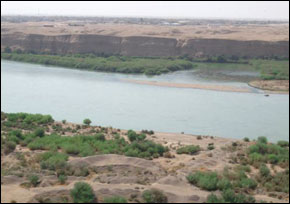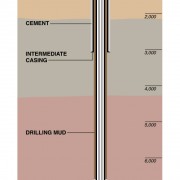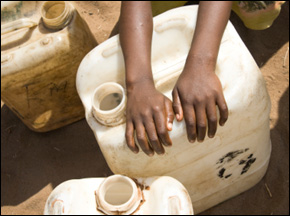Water: Iraq’s Other Problem
 Add water shortage to the list of problems besetting the Iraqi government.
Add water shortage to the list of problems besetting the Iraqi government.
Water was a top priority during a series of agreements signed by Iraqi Prime Minister Nouri al-Maliki and Turkish Prime Minister Recep Tayyip Erdo?an in Baghdad Thursday, Reuters reports. The Iraqi parliament has also agreed to block any agreement with Turkey or Syria that does not include water-sharing provisions.
These actions come in light of an historic drought that is causing internal displacement of people, failure of agricultural land and a domestic water supply crisis within Iraq, according to several news reports.
Turkey affirmed it will release more water to Iraq from the Euphrates River — increasing flows from 250 cubic meters per second (cms) to no more than 500 cms. Circle of Blue previously reported that Iraq had demanded higher water releases in September. The agreement is part of the High Strategic Collaboration, a package that includes deals on energy cooperation, transportation, trade and security.
But more water is needed throughout Iraq. United Nations Education, Scientific, and Cultural Organization (UNESCO) reports that more than 100,000 people in northern Iraq have fled their homes since 2005 because of inadequate water supplies.
The karez system of underground aqueducts that provides water for domestic and agricultural use has begun to fail due to drought and excessive water withdrawals. Nearly 70 percent of the karez in northern Iraq has dried up in the past four years.
The karez system is designed for arid regions in which surface water suffers from high evaporation rates. UNESCO warns that, given historical reliance on groundwater, the failure of the karez is “an early warning signal” for communities in the region that use wells or natural springs to obtain water.
Though the karez failure is serious, the situation in southern Iraq may be even worse.
Iran has begun shipping 650,000 liters of water by tanker twice a week to communities around Basra, according to Press TV. Roughly two million people are without drinking water in the area.
Drought in southern Iraq has allowed seawater to intrude the water table — spoiling the surface and groundwater. Basra’s agricultural director is about to declare a water crisis because salinity levels have prevented crops from growing, according to Xinhua news report. Iraq’s vice president called on upstream Iran to release more water from the Karun and Karkheh rivers to alleviate the crisis.
Iraq also blames upstream dams in Turkey for the river’s low levels, which permit seawater intrusion in the Tigris and Euphrates. Both sides tried to ameliorate the situation with Thursday’s agreement.
Brett writes about agriculture, energy, infrastructure, and the politics and economics of water in the United States. He also writes the Federal Water Tap, Circle of Blue’s weekly digest of U.S. government water news. He is the winner of two Society of Environmental Journalists reporting awards, one of the top honors in American environmental journalism: first place for explanatory reporting for a series on septic system pollution in the United States(2016) and third place for beat reporting in a small market (2014). He received the Sierra Club’s Distinguished Service Award in 2018. Brett lives in Seattle, where he hikes the mountains and bakes pies. Contact Brett Walton









Leave a Reply
Want to join the discussion?Feel free to contribute!